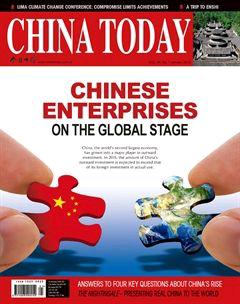Confidence Crises Threaten Chinese Listings Abroad
By XIANG ANBO
FOREIGN capital markets appeal strongly to Chinese enterprises for their scale, high efficiency and good services. Chinese enterprises now seek listings on foreign stock exchanges as the best way to do business abroad, the United States the most favored destination.
In 2013, 66 Chinese enterprises were listed abroad, accounting for 15.1 percent of the global total of newly listed companies. They raised a cumulative US $19.012 billion, making up 18.9 percent of the world total.
The fi rst half of 2014 witnessed the successful listing of 10 Chinese enterprises in the U.S., and the raising of US $3.1 billion, a year-on-year growth of 900 percent and 3,830 percent respectively. Then in September 2014,Chinas e-commerce giant Alibaba made its initial public offer (IPO) on the New York Stock Exchange, raising US$21.8 billion, a historical record in the U.S.
Confidence Crisis
Despite the increase in overseas listings, Chinese companies still need to take a hard look at the confidence crisis that embroiled some of them in the U.S. three years ago. This will help them gain insight and experience when doing business in the international capital market. Such a review will also help international investors understand the problems that Chinese firms encounter when they integrate with the world economy.
The most recent crisis began in October 2010. Over the following five months eight Chinese firms were delisted from the U.S. In March 2011, the situation deteriorated further. From March to June, 24 Chinese companies listed in the U.S. suffered from auditors who resigned or exposed their financial problems, and 19 were suspended or delisted. American critics exaggerated these cases, highlighting deception by Chinese companies and fanning the flames.
In the following months the mistrust of small and medium-sized Chinese reverse takeover (RTO) firms gradually escalated into a crisis affecting all Chinese concept stocks. Stockbrokers adjusted their policies, and the American supervisory body adopted much stricter requirements towards Chinese firms engaged in RTO, and investigated two Chinese concept firms.
Adversely influenced by these factors, Chinese concept stocks plunged, even those innocent of financial fraud. Of the 13 Chinese firms listed in the U.S. in 2011, 12 fell below their asking prices.
Lessons Learned
Thorough examination of the crisis could help pinpoint the reasons and lessons behind it.
First, it must be acknowledged that the actions taken by the U.S. Securities and Exchange Commission (SEC) and security broking institutions all fell under the category of normal supervision and investment practices. The SECs warnings and investigations are part of its regulatory duties. Moreover, U.S. brokers were reasonable in banning clients from borrowing capital to buy Chinese concept stocks. Deleveraging was not in particular targeting Chinese firms, and shortselling is a normal practice in the American capital market. The overall situation was not out of hand, as China concluded. After all, of the Chinese firms listed in the U.S. fewer than 10 percent faced credit problems, and as a result were suspended or delisted.
Second, the confidence crisis can be ascribed to several reasons. Some Chinese firms were fraudulently listed; some were deceived by malignant intermediaries due to lack of experience or expertise in international listing and financing. Finally, internal problems within the capital market also contributed to the crisis.
In a nutshell, although triggered by strict supervision of overseas markets and fueled by speculation, the confidence crisis reflected differences in the Chinese and American corporate cultures and legal systems. The crisis damaged the image of Chinese businesses and reduced investor confidence in China and Chinese firms. However, it also had a positive outcome in prompting Chinese enterprises to better regulate themselves, as well as compelling the Chinese government to strengthen supervision.
Long-term Mechanism
As the frenzy for overseas listing reemerges, Chinese enterprises hoping to be listed abroad are paying more attention to their investor relations management, and have tightened scrutiny of their agencies and lawyers. Today Chinese firms are more likely to be transparent, abide by international rules, and are building on their emergency and crisis response capacity.
At the government level, Chinese authorities have acted to maintain the image and interests of Chinese businesses as well as those of the country at large. They use multiple channels to clarify situations and avoid media spin. Different coping strategies are deployed in light of the specific situations of Chinese firms, to prevent individual scandals from snowballing into a conspiracy to sabotage the Chinese economy.
Naturally, to preclude another confidence crisis the country must establish and improve its public relations mechanism for economic affairs and crisis management.
First, while encouraging companies to participate in economic globalization, the Chinese government should include overseas listings in its economic planning, improve bilateral/multilateral cooperation mechanisms, and provide professional services for Chinese companies in the fields of overseas listing and investment. Relevant authorities and agencies could provide firms with standard training in investment policies and laws in target foreign countries, preparing them to do business overseas and helping them formulate strategic plans.
Second, China should step up its efforts to improve the domestic capital market, so that more local companies would choose to be listed at home. For example, the country can provide them more financing channels by enhancing its multi-level capital market system. Meanwhile, supervisory bodies should strengthen institutional contruction regarding share trading, internal control of securities companies, delisting, and restitution for investors, among others. Any company that is caught cheating must be brought to justice.
Third, China should help its enterprises improve their abilities to thrive and survive in international capital markets. The country should set up a sound corporate credit system in line with international practices and conforming to domestic conditions and market rules. In this way Chinese enterprises will become acquainted with foreign capital markets, develop greater awareness of public relations, hone their ability to communicate effectively and learn to protect themselves through legal means in foreign markets.

